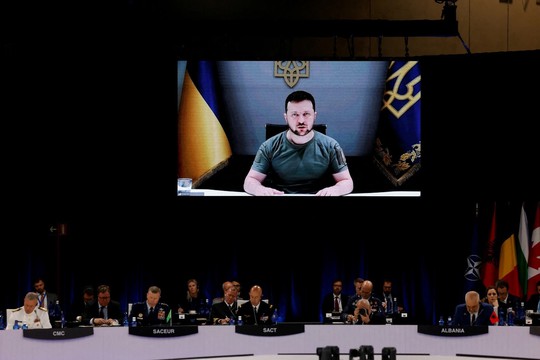Ukraine’s relationship with its international partners has become increasingly complex, and it was perhaps inevitable that tensions and differences of opinion between Kyiv and its allies arose as the war with Russia dragged on, CNBC stresses.
Ukraine has to tread a fine line with its international friends. It is reliant on its partners for billions of dollars’ worth of military hardware, as well as other forms of humanitarian and financial assistance, and it needs a continuous and increasing supply of arms to fight Russia. It insists, however, that it is fighting not only for its own survival but for the West too,
Kyiv’s biggest individual benefactors like the U.S. and U.K., who have given over $40 billion and $4 billion in security assistance to Ukraine, respectively, have pledged to support Ukraine till the end. The phrase “whatever it takes” has become a mantra often repeated at public gatherings of allies assessing the war and the military needs of Ukraine.
Kyiv has repeatedly thanked its partners for their help but, behind the scenes, frustrations have also come to a head and Ukraine’s ongoing needs and demands — and the military and political considerations of its allies — have clashed at times, prompting uncomfortable encounters.
Most recently, tensions have emerged over Ukraine’s military strategy and demands on NATO. Ukraine’s President Volodymyr Zelenskyy is said to have angered some allies ahead of the most recent NATO summit in Vilnius in July, when he described the lack of a timetable over the thorny issue of NATO membership, and “conditions” that needed to be met before an invitation to join was issued, as “absurd.”
For some officials in Washington and London, Zelenskyy’s decision to tell his staunch backers that Ukraine deserved “respect,” as NATO met to discuss additional support for Kyiv, was a step too far.
Britain’s Defense Secretary Ben Wallace, perhaps unburdened by his forthcoming departure from the role, took umbrage at Zelenskyy’s comments, saying Kyiv should be mindful of war fatigue and skeptics among its allies questioning the massive amount of continued funding. The U.K., for one, he said, was not an Amazon warehouse that could supply endless weaponry to Kyiv when it was given a “shopping list.”
Needless to say, Zelenskyy’s comments didn’t go down well in Washington either and the Washington Post reported sources noting that U.S. officials had been so roiled that they had briefly considered watering-down what Kyiv would be offered at the summit.
“The comments made by Zelenskyy before the last summit did not really resonate well in Washington ... the U.S. administration was very annoyed,” a source with knowledge of the matter who asked to remain anonymous due to the sensitivity of the situation, told CNBC.
“So the U.S. is strongly advising Ukraine not to do certain things, but Kyiv does them anyway, brushing aside or not addressing U.S. concerns. And they come at the United States, or Washington or the Biden administration, complaining about not being involved in NATO talks,” the CNBC source said.
Drawing on his own experience of working in NATO, Jamie Shea told CNBC that support for Ukraine among its allies remains strong but that the Vilnius summit had highlighted points of vulnerability, and the need for diplomacy and compromise.
Shea said Zelenskyy would have known that NATO would not be able to accede to Kyiv’s demands for a timetable on membership, or an invite to become a member of NATO while the war is ongoing. And by threatening to boycott the summit, Zelenskyy had played a risky strategy, Shea noted, potentially setting the meeting up for failure.
In the end, cooler heads prevailed: “The United States and the NATO allies worked overtime to convince him that he should look at the glass half full and at all the things that he was getting,” Shea noted.
Shea noted that Ukraine’s position was a difficult one, however, and that there’s bound to be a gap between what the Ukrainians want and what the West is able to provide “and occasionally, that’s going to boil over into frustration.”
It’s not only at a diplomatic level that Ukraine has irked its allies.
Kyiv is believed to have annoyed the U.S. when it decided to continue fighting for Bakhmut, a town in eastern Ukraine that has found itself at the epicenter of fierce warfare between Russian and mercenary forces and Ukrainian troops for over a year.
Ukraine decided to fight on, however, with that decision causing consternation in the U.S., according to Konrad Muzyka, a military intelligence specialist and president of Rochan Consulting.
″[But] the result is that they’ve lost a lot of men, and very experienced personnel as well. They expedited a lot of artillery munition, which would otherwise be used for this counteroffensive, and lastly, they burned out a lot of barrels for their guns, meaning they are unable to fully support their forces in the Bakhmut area.”
Now, anticipation is rising for the “strike” part of the strategy with speculation mounting that Ukraine has just started to commit a portion of its reserve forces, including NATO-trained and NATO-equipped brigades, for a big push in an attempt to break through Russian defenses in southern Ukraine.
“Ukraine feels under pressure from his Western backers, to show progress in this counteroffensive, to prove to itself and the rest of us that this war can be won on the battlefield,” Retired British General Richard Barrons said. “The very worst outcome for Ukraine would be that they would take this uncommitted force and batter it to pieces on the front end of Russian fortifications they’ve not been able to break through. That would be a tragedy this year for the Ukrainian campaign.”
read more in our Telegram-channel https://t.me/The_International_Affairs

 8:12 05.08.2023 •
8:12 05.08.2023 •























